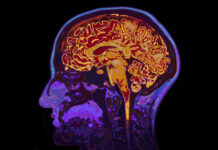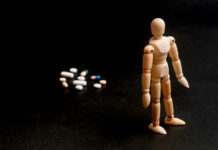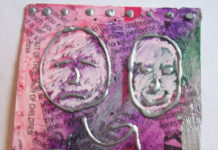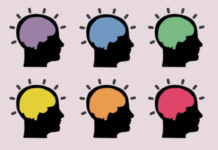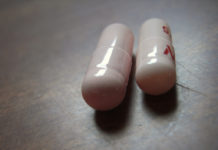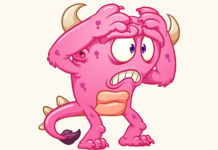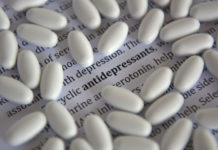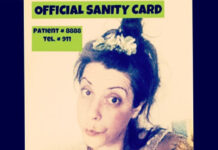“Virtual Autism” May Explain Explosive Rise in ASD Diagnoses
New clinical case studies have found that many young children who spend too much screen time—on TV’s, video games, tablets and computers—have symptoms labeled as “autism.” When parents take away the screens for a few months the child’s symptoms disappear.
Antidepressant-Induced Mania
It is generally recognized in antipsychiatry circles that antidepressant drugs induce manic or hypomanic episodes in some of the individuals who take them. Psychiatry's usual response to this is to assert that the individual must have had an underlying latent bipolar disorder that has "emerged" in response to the improvement in mood. The problem with such a notion is that it is fundamentally unverifiable.
The Unsung Psychiatric Impact of Strep Throat
A sea change is needed in the evaluation of children with perceived psychological disturbances. Parents are told that their child has a fictitious biochemical imbalance in the brain while real medical disorders are overlooked. In our family's case, it was Pediatric Autoimmune Neuropsychiatric Disorder Associated with Strep (PANDAS).
Michelle Carter: Did She Text Her Boyfriend to Death?
Today a Massachusetts judge sentenced Michelle Carter for the crime of manslaughter in the suicide death of her boyfriend. I was the only psychiatric and medication expert on either side in this trial, and I testified on behalf of Michelle. Other than perhaps her lawyers, I probably know more about the true story than anyone else.
Lancet Psychiatry Needs to Retract the ADHD-Enigma Study
Lancet Psychiatry, a UK-based medical journal, recently published a study that concluded brain scans showed that individuals diagnosed with ADHD had smaller brains. That conclusion is belied by the study data. The journal needs to retract this study.
UPDATE: Lancet Psychiatry (online) has published letters critical of the study, and the authors' response, and a correction.
My Daughter and Prozac
While our daughter was growing up, my ex-wife treated our daughter’s body like a temple. She was the only kid among her friends not allowed to drink soda or cow’s milk as they might negatively affect her health. But Prozac for mild anxiety? Sure, no problem. I was honestly and genuinely shocked.
Psychiatry Defends Its Antipsychotics: A Case Study of Institutional Corruption
Jeffrey LIeberman and colleagues have published a paper in the American Journal of Psychiatry stating that there is no evidence that psychiatric drugs cause long-term harm, and that the evidence shows that these drugs provide a great benefit to patients. A close examination of their review reveals that it is a classic example of institutional corruption, which was meant to protect guild interests.
Suicide in the Age of Prozac
During the past twenty years, the American Foundation for Suicide Prevention and American psychiatry have adopted a "medicalized" approach to preventing suicide, claiming that antidepressants are protective against suicide. Yet, the suicide rate in the United States has increased 30% since 2000, a time of rising usage of antidepressants. A review of studies of the effects of mental health treatment and antidepressants on suicide reveals why this medicalized approach has not only failed, but pushed suicide rates higher.
Researcher Acknowledges His Mistakes in Understanding Schizophrenia
Sir Robin Murray, a professor at the Institute of Psychiatry, Psychology, and Neuroscience in London, states that he ignored social factors that contribute to ‘schizophrenia’ for too long. He also reports that he neglected the negative effects antipsychotic medication has on the brain.
Study Finds ADHD Drugs Alter Developing Brain
A new study, published in the JAMA Psychiatry, investigates the effect of stimulant ‘ADHD’ drugs on the brains of children and young adults. The...
Why the Rise of Mental Illness? Pathologizing Normal, Adverse Drug Effects, and a Peculiar...
In just two decades, pointing out the pseudoscience of the DSM has gone from being an “extremist slur of radical anti-psychiatrists” to a mainstream proposition from the former chairs of both the DSM-3 and DSM-4 taskforces and the director of NIMH. In addition to the pathologizing of normal behaviors, another explanation for the epidemic — the adverse effects of psychiatric medications — is also evolving from radical to mainstream, thanks primarily to the efforts of Robert Whitaker and his book Anatomy of an Epidemic. While diagnostic expansionism and Big Pharma certainly deserve a large share of the blame for this epidemic, there is another reason.
Rigorous Study Finds Antidepressants Worsen Long-Term Outcomes
A new study conducted by Jeffrey Vittengl at Truman University has found that taking antidepressant medications resulted in more severe depression symptoms after nine years.
Hereditary Madness? The Genain Sisters’ Tragic Story
The story of the Genain quadruplets has long been cited as evidence proving something about the supposed hereditary nature of schizophrenia. But who wouldn’t fall apart after surviving a childhood like theirs? The doctors attributed their problems to menstrual difficulties or excessive masturbation — anything except abuse.
Part II: Michelle Starts Prozac and Sees the Devil
By 2011, anyone who read the scientific literature would have known that children cannot tolerate SSRIs and should not be given them. Neither Conrad nor Michelle seemed to have been warned about the common adverse effects (such as nightmares and compulsive suicidality) of the SSRI antidepressants they were on.
Neurodiversity is Dead. Now What?
The neurodiversity movement is a public relations campaign that emphasizes the positive qualities associated with some presentations of autism—creativity, increased tolerance for repetition, enhanced empathy, and exceptional memory—while erasing or minimizing the experiences of autistics who are severely disabled.
Peer-Support Groups Were Right, Guidelines Were Wrong: Dr. Mark Horowitz on Tapering Off Antidepressants
In an interview with MIA, Dr. Horowitz discusses his recent article on why tapering off antidepressants can take months or even years.
ADHD Diagnosis Based on “Illogical Rhetoric,” Analysis Claims
In a philosophically rigorous article, Spanish researcher Marino Pérez-Álvarez examines the logic of attention-deficit hyperactivity disorder (ADHD).
Trauma, Psychosis, and Dissociation
Recent years have seen an influx of numerous studies providing an undeniable link between childhood/ chronic trauma and psychotic states. Although many researchers (i.e., Richard Bentall, Anthony Morrison, John Read) have been publishing and speaking at events around the world discussing the implications of this link, they are still largely ignored by mainstream practitioners, researchers, and even those with lived experience. While this may be partially due to an understandable (but not necessarily defensible) tendency to deny the existence of trauma, in general, there are also certainly many political, ideological, and financial reasons for this as well.
Antidepressant Use Leads to Worse Long Term Outcomes, Study Finds
Results from a 30-year prospective study demonstrated worse outcomes for people who took antidepressants, even after controlling for gender, education level, marriage, baseline severity, other affective disorders, suicidality, and family history of depression.
Helping Children to Overcome OCD: 6 Creative Strategies for Parents
Here, Dr. Ben Furman offers a creative approach to helping children who struggle with OCD. Explaining why behaviors like reasoning, reassuring, and superstitious rituals don’t work, he suggests engaging alternatives that teach kids how to manage their “worry monster” and make sense of their distressing experience.
New Study Concludes that Antidepressants are “Largely Ineffective and Potentially Harmful”
A new study published in Frontiers in Psychiatry concludes that “antidepressants are largely ineffective and potentially harmful.”
What’s the Harm in Taking an Antidepressant?
We know that all drugs have side effects. That’s just part of the deal right? But is it really possible that an antidepressant can cause a sane person to act like a cold-blooded criminal?
My Diagnosis of ADHD and the Downfall That Followed
A simple, one-time visit to an unfamiliar counselor resulted in my diagnosis of ADHD. That same visit started my avalanche of drug abuse. I was 19 years old when I was falsely diagnosed with ADHD, and it forever changed my life.
Bipolar Diagnosis Linked to Childhood Adversity
With the ties between traumatic childhood experiences and mental health issues, should we continue to focus on biological approaches?
Schizophrenia Deconstructed
After a few weeks it became clear to me the complete lack of comprehension that I faced as a person claiming to have been cured of psychosis. Being a schizophrenic claiming to no longer suffer from schizophrenia only made me seem more schizophrenic due to the current culture of psychiatry.





